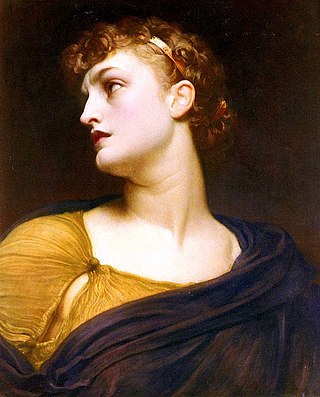
In Greek mythology, Antigone is a Theban princess, and a character in several ancient Greek tragedies. She is the daughter of Oedipus, king of Thebes. Her mother is Jocasta. In another variation of the myth, her mother is Euryganeia. She is a sister of Polynices, Eteocles, and Ismene. The meaning of the name is, as in the case of the masculine equivalent Antigonus, "in place of one's parents" or "worthy of one's parents". Antigone appears in the three 5th century BC tragic plays written by Sophocles, known collectively as the three Theban plays. She is the protagonist of the tragedy Antigone. She makes a brief appearance at the end of Aeschylus' Seven against Thebes, while her story was also the subject of Euripides' now lost play with the same name.

Antigone is an Athenian tragedy written by Sophocles in 441 BC and first performed at the Festival of Dionysus of the same year. It is thought to be the second oldest surviving play of Sophocles, preceded by Ajax, which was written around the same period. The play is one of a triad of tragedies known as the three Theban plays, following Oedipus Rex and Oedipus at Colonus. Even though the events in Antigone occur last in the order of events depicted in the plays, Sophocles wrote Antigone first. The story expands on the Theban legend that predates it, and it picks up where Aeschylus' Seven Against Thebes ends. The play is named after the main protagonist Antigone.
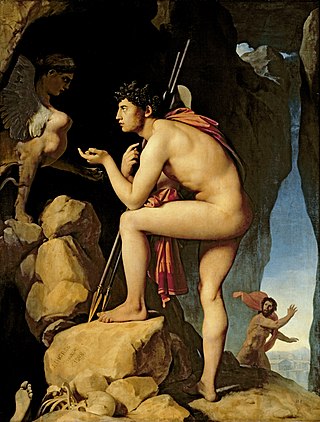
Oedipus was a mythical Greek king of Thebes. A tragic hero in Greek mythology, Oedipus fulfilled a prophecy that he would end up killing his father and marrying his mother, thereby bringing disaster to his city and family.

Seven Against Thebes is the third play in an Oedipus-themed trilogy produced by Aeschylus in 467 BC. The trilogy is sometimes referred to as the Oedipodea. It concerns the battle between an Argive army, led by seven champions including Polynices who were called the Seven against Thebes, and the army of Thebes led by Eteocles and his supporters. The trilogy won the first prize at the Athens City Dionysia. The trilogy's first two plays, Laius and Oedipus, as well as the satyr play Sphinx, are no longer extant.

In Greek mythology, Eteocles was a king of Thebes, the son of Oedipus and either Jocasta or Euryganeia. Oedipus killed his father Laius and married his mother without knowing his relationship to either. When the relationship was revealed, he was expelled from Thebes. The rule passed to his sons Eteocles and Polynices. However, because of a curse from their father, the two brothers did not share the rule peacefully and died as a result, ultimately killing each other in battle for control of the city. Upon his death, Eteocles was succeeded by his uncle, Creon.

In Greek mythology, Polynices was the son of Oedipus and either Jocasta or Euryganeia and the older brother of Eteocles. When Oedipus was discovered to have killed his father and married his mother, Oedipus was expelled from Thebes, leaving Eteocles and Polynices to rule. Because of a curse put on them by their father, the two sons did not share the rule peacefully. During a battle for control over Thebes, the brothers killed each other.
In Greek mythology, Adrastus or Adrestus, , was a king of Argos, and leader of the Seven against Thebes. He was the son of the Argive king Talaus, but was forced out of Argos by his dynastic rival Amphiaraus. He fled to Sicyon, where he became king. Later he reconciled with Amphiaraus and returned to Argos as its king.
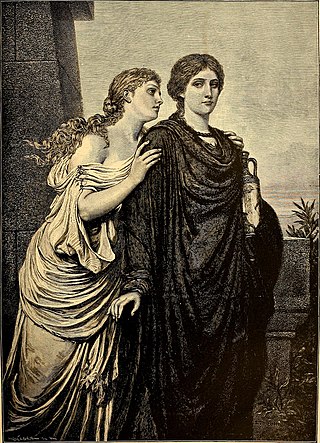
In Greek mythology, Ismene is a Theban princess. She is the daughter and half-sister of Oedipus, king of Thebes, daughter and granddaughter of Jocasta, and sister of Antigone, Eteocles, and Polynices. She appears in several tragic plays of Sophocles: at the end of Oedipus Rex, in Oedipus at Colonus and in Antigone. She also appears at the end of Aeschylus' Seven Against Thebes.

In Greek mythology, Jocasta, also rendered Iocaste and also known as Epicaste, was a daughter of Menoeceus, a descendant of the Spartoi Echion, and queen consort of Thebes. She was the wife of first Laius, then of their son Oedipus, and both mother and grandmother of Antigone, Eteocles, Polynices and Ismene. She was also sister of Creon and mother-in-law of Haimon.

The Seven against Thebes were seven champions in Greek mythology who made war on Thebes. They were chosen by Adrastus, the king of Argos, to be the captains of an Argive army whose purpose was to restore Oedipus' son Polynices to the Theban throne. Adrastus, although always the leader of the expedition against Thebes, was not always counted as one of the Seven champions. Usually the Seven were Polynices, Tydeus, Amphiaraus, Capaneus, Parthenopaeus, Hippomedon, and Adrastus or Eteoclus, whenever Adrastus is excluded. They tried and failed to take Thebes, and all but Adrastus died in the attempt.

The Nymphalinae are a subfamily of brush-footed butterflies. Sometimes, the subfamilies Limenitidinae, and Biblidinae are included here as subordinate tribe(s), while the tribe Melitaeini is occasionally regarded as a distinct subfamily.
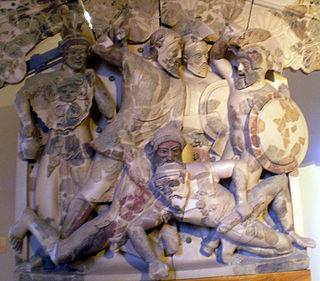
The Theban Cycle is a collection of four lost epics of ancient Greek literature which tells the mythological history of the Boeotian city of Thebes. They were composed in dactylic hexameter verse and believed to be recorded between 750 and 500 BC. The epics took place before the Trojan War and centered around the Theban royal family.
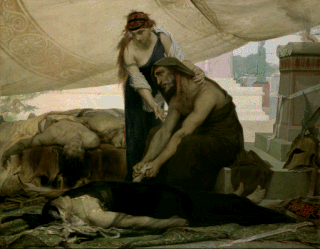
The Phoenician Women is a tragedy by Euripides, based on the same story as Aeschylus' play Seven Against Thebes. It was presented along with the tragedies Hypsipyle and Antiope. With this trilogy, Euripides won the second prize. The title refers to the Greek chorus, which is composed of Phoenician women on their way to Delphi who are trapped in Thebes by the war. Unlike some of Euripides' other plays, the chorus does not play a significant role in the plot, but represents the innocent and neutral people who very often are found in the middle of war situations. Patriotism is a significant theme in the story, as Polynices talks a great deal about his love for the city of Thebes but has brought an army to destroy it; Creon is also forced to make a choice between saving the city and saving the life of his son.

Olden Polynice is a Haitian former professional basketball player. He played center for the Seattle SuperSonics, Los Angeles Clippers, Detroit Pistons, Sacramento Kings, and Utah Jazz of the National Basketball Association (NBA).

The dynastic history of Thebes in Greek mythology is crowded with a bewildering number of kings between the city's new foundation and the Trojan War. This suggests several competing traditions, which mythographers were forced to reconcile.

Œdipe à Colone is an operatic tragédie lyrique by Antonio Sacchini first performed at Versailles on 4 January 1786 in the presence of King Louis XVI and Marie Antoinette. The libretto, by Nicolas-François Guillard, is based on the play Oedipus at Colonus by Sophocles. The premiere, intended to inaugurate the new theatre at Versailles, was not a success, possibly due to the quality of the performances, the staging, or the acoustics. Marie Antoinette promised Sacchini a better production at Fontainebleau in the autumn, but the Affair of the Diamond Necklace meant she was unable to have her wish. The news that the production was cancelled is said to have hastened the death of the already seriously ill composer on October 9, 1786. Œdipe was given a posthumous performance by the Paris Opera at the Théâtre de la Porte Saint-Martin on February 1, 1787. This time the audience was warmly appreciative and the opera became one of the most popular pieces in the repertoire for several decades, reaching a total of almost 600 performances by 1844.

The Thebaid is a Latin epic poem written by the Roman poet Statius. Published in the early 90s AD, it contains 12 books and recounts the clash of two brothers, Eteocles and Polynices, over the throne of the Greek city of Thebes. After Polynices is sent into exile, he forges an alliance of seven Greek princes and embarks on a military campaign against his brother.
Antigona (Antigone) is an opera in three acts in Italian by the composer Tommaso Traetta. The libretto, by Marco Coltellini, is based on the tragedy Antigone by Sophocles.

Antigone is a play by the Attic dramatist Euripides, which is now lost except for a number of fragments. According to Aristophanes of Byzantium, the plot was similar to that of Sophocles' play Antigone, with three differences. The date of the play is uncertain, but there is evidence that it was written late in Euripides' career, between 420 BCE and 406 BCE.

Antigone is a 2019 Canadian drama film directed by Sophie Deraspe. An adaptation of the ancient Greek play Antigone by Sophocles, the film transposes the story to a modern-day refugee family in Montreal. The cast includes Nahéma Ricci as Antigone, with Rawad El-Zein, Hakim Brahimi, Rachida Oussaada, and Nour Belkhiria. It was filmed in Greater Montreal in 2018.























